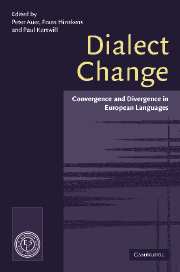Book contents
- Frontmatter
- Contents
- List of maps
- List of figures
- List of contributors
- Preface
- Map
- 1 The study of dialect convergence and divergence: conceptual and methodological considerations
- Part 1 Convergence, Divergence and Linguistic Structure
- Part 2 Macrosociolinguistic Motivations of Convergence and Divergence
- 6 Processes of standardisation in Scandinavia
- 7 The birth of new dialects
- 8 Dialect convergence in the German language islands (Sprachinseln)
- 9 Political borders and dialect divergence/convergence in Europe
- 10 The influence of urban centres on the spatial diffusion of dialect phenomena
- Part 3 Microsociolinguistic Motivations
- References
- Index
8 - Dialect convergence in the German language islands (Sprachinseln)
Published online by Cambridge University Press: 22 September 2009
- Frontmatter
- Contents
- List of maps
- List of figures
- List of contributors
- Preface
- Map
- 1 The study of dialect convergence and divergence: conceptual and methodological considerations
- Part 1 Convergence, Divergence and Linguistic Structure
- Part 2 Macrosociolinguistic Motivations of Convergence and Divergence
- 6 Processes of standardisation in Scandinavia
- 7 The birth of new dialects
- 8 Dialect convergence in the German language islands (Sprachinseln)
- 9 Political borders and dialect divergence/convergence in Europe
- 10 The influence of urban centres on the spatial diffusion of dialect phenomena
- Part 3 Microsociolinguistic Motivations
- References
- Index
Summary
Language Island Research: The Traditional Framework and Some Sociolinguistic Questions
The metaphor of a ‘language island’ was coined with reference to the ‘colonies’ of German-speaking settlers in Eastern, Central, and South Eastern Europe, which were mostly founded in the late Middle Ages (‘old language islands’) and in the eighteenth and nineteenth centuries (‘new language islands’), and which for a long time preserved their ethnic, linguistic, cultural, economic, administrative, and sometimes religious distinctness from the surrounding society. Brought in by the state authorities or private colonisers, the settlers cultivated the land, introducing new methods of agriculture, trade, crafts, and mining, stabilising political borders, and increasing the proportion of educated, skilled (and sometimes ‘white’) population; however, for a long time they did not mingle with the surrounding population.
Since these linguistic communities were founded by settlers speaking different dialects – but lacking the German standard language – they have been subject to dialect convergence from the first days of their existence. The dialects of these language islands are therefore more or less mixed or levelled dialects, as was noted by the Russian dialectologist Victor Schirmunski (1930). For him, the ‘language islands’ were a ‘linguistic laboratory’ bringing about the same linguistic processes in short time which over centuries have shaped our contemporary standard languages. Only in the twentieth century did the language islands open to outside linguistic influence from the surrounding language(s).
Information
- Type
- Chapter
- Information
- Dialect ChangeConvergence and Divergence in European Languages, pp. 221 - 235Publisher: Cambridge University PressPrint publication year: 2005
Accessibility standard: Unknown
Why this information is here
This section outlines the accessibility features of this content - including support for screen readers, full keyboard navigation and high-contrast display options. This may not be relevant for you.Accessibility Information
- 15
- Cited by
